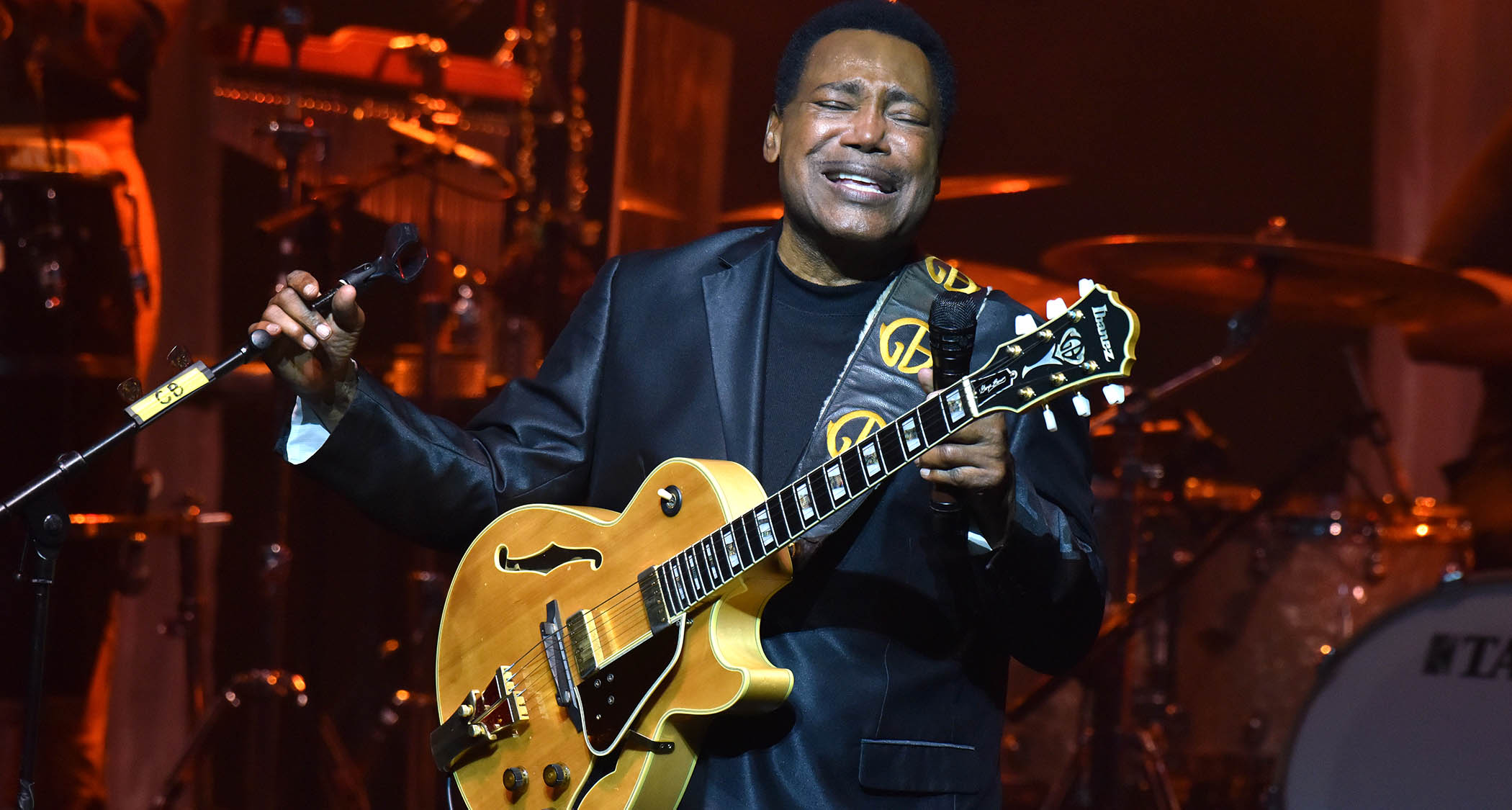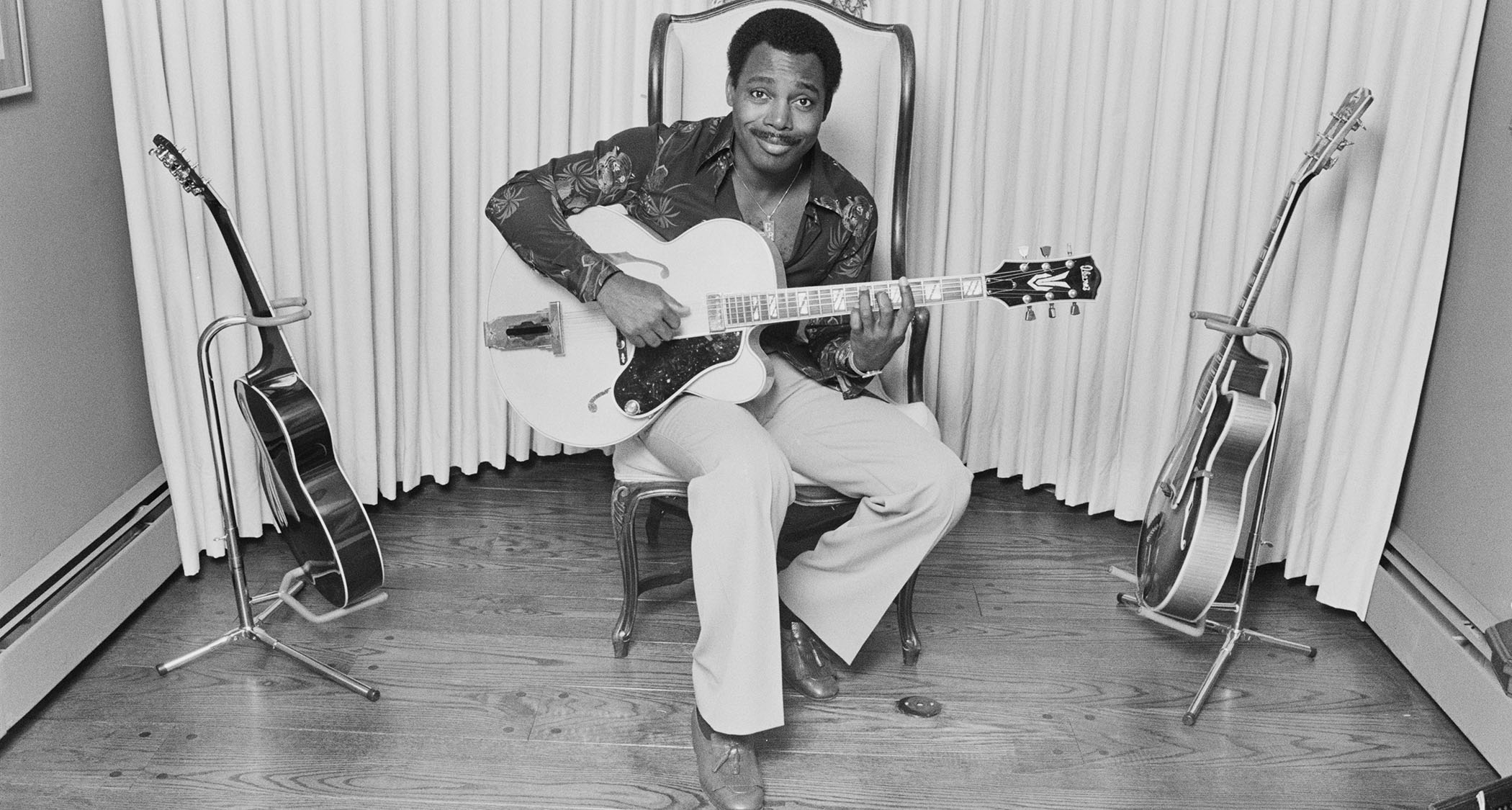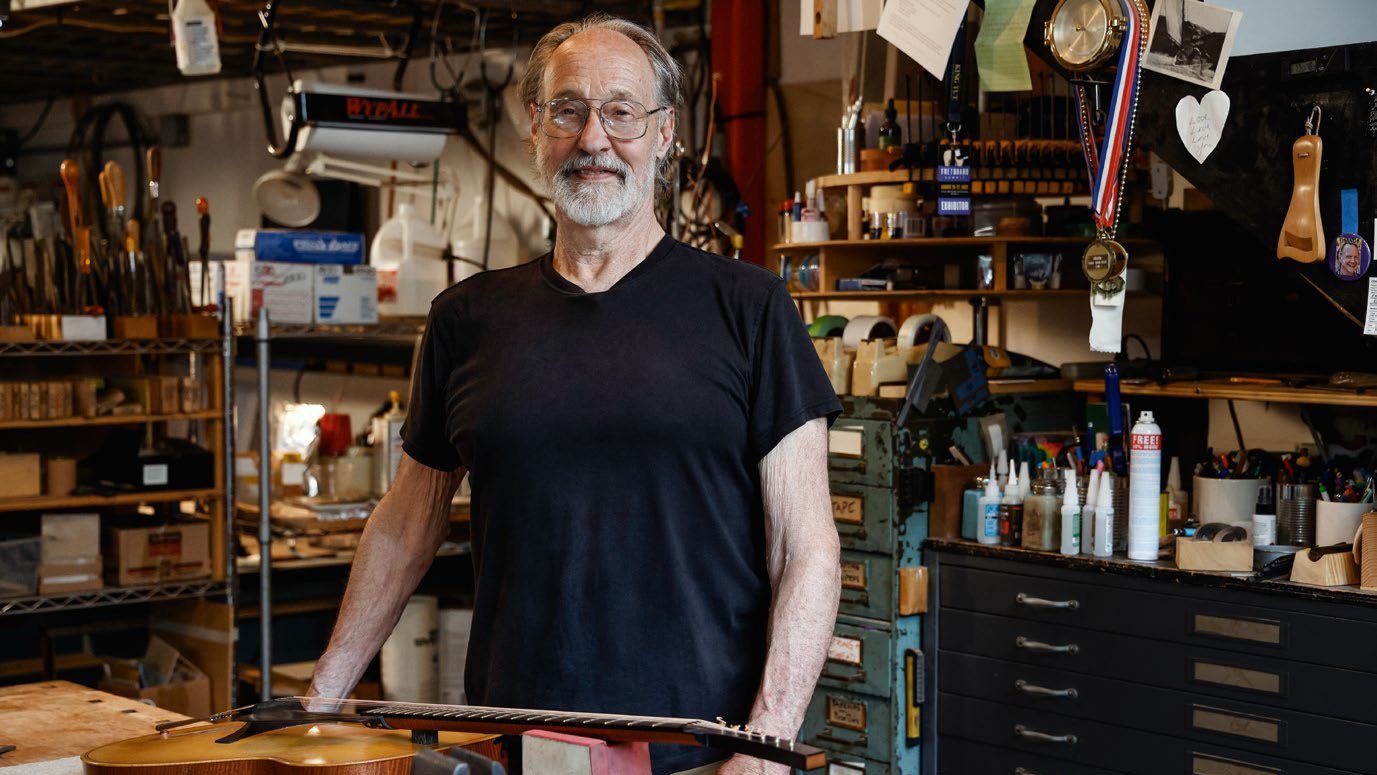“I had a hard time playing in tune. The producer stopped me and said, ‘George, tune up again.’ I didn’t realize the value of that until Breezin’ came out”: How George Benson landed a hit album by breaking the rules – and learning to play in tune
As Benson prepares to share his skills first-hand in an immersive music experience, the jazz guitar legend looks back on a magical career and explains why he's still learning

At 81 years of age, George Benson remains razor-sharp on guitar – and in conversation. So sharp, in fact, that he’s embarking on a new and exciting journey: Breezin’ With The Stars, an immersive music event happening in Arizona in January.
It’s set to be jam-packed with workshops, performance, storytelling and expertise accumulated over a lifetime. And he’ll share this new platform with the likes of Steve Lukather, John Scofield, Tommy Emmanuel and many more.
“One of the big things is learning and obtaining knowledge,” Benson tells Guitarist. “But also, imparting that knowledge. I practice a lot. I live with the guitar; I don’t call it practice. I can’t pass by a guitar without picking it up.”
Given the fact he’s more than 40 albums deep, Benson’s passion for six-strings remains astounding. One would think boredom or redundancy would factor in, but no, it’s just the opposite: “I have guitars all over my house,” he says with a laugh. “I have them in strategic places, and every time I see that handle sticking up, I grab it, sit down and learn something.”
Benson’s tendency to perpetually pal around with his guitar has led to a genre-traversing career like no other. Simply put, when you hear him play, you damn well know it’s George Benson.
When people asked me about the guitar, I’d tell them, ‘I’m still learning.’ If I learn something, I’ll give it to someone, but right now, I’m still learning
“People say, ‘Hey, man, what’s the new formula you’re doing?’” he tells us. “I’d play something and come across a new invention, and I say, ‘Oh, that’s just something I’m working on.’ But people would say, ‘Man, whatever you’re working on, you’ve got it mastered and it’s nobody else but you.’”
Benson remains humble and harbors everlasting appreciation for his lot in life. He loves to pass on whatever he can, which is what Breezin’ With The Stars is all about.
All the latest guitar news, interviews, lessons, reviews, deals and more, direct to your inbox!
“Later in life, when people asked me about the guitar, I’d tell them, ‘I’m still learning.’ If I learn something, I’ll give it to someone, but right now, I’m still learning. But I always tell people, ‘Don’t ever doubt you can do it. Keep doing what you do and keep a good attitude and use that knowledge.’”

You’ve never done something quite like Breezin’ With The Stars before. Why now?
“No, I have never done anything like this. I thought about it many years ago, but it’s quite a different thing for me. But I liked the idea. Most of the guitar players who are going to be with us have never been in the same place at the same time. It’s something new, they’re all my friends, are great players, and it’s going to be very special.”
What are your greatest hopes for the event?
“I know what gets players to where they feel something about the instrument. Knowledge is key; the Bible says it’s the key to everything. The more knowledge you have about what you’re doing, the better off you are. You can pick any style of music. What I always tell my friends is, ‘Just keep your ears open and you’ll learn something.’”
Why is it important to pass your knowledge on?
“Because I realised [others] didn’t understand what was in front of them. I didn’t understand that when I was coming up; I didn’t understand and didn’t have the room that they have now. Back in those days, if you were a rock guitar player, that’s what you were all your life. You could not come out of that like now.”
When I started hearing people such as Glen Campbell coming out and Wes Montgomery, and they crossed over, I noticed and thought, ‘Hey, I can stretch out’
You’re a big part of that with how fearlessly you’ve traversed the genres.
“My managers and the people who were involved in my career didn’t believe what I was telling them. I said, ‘I can’t play that music.’ They said, ‘No, you’re just jealous.’ I said, ‘No, no, I played that when I was 12 years old, but the world doesn’t want to hear that.’ They kept telling me, ‘You’re going to be this kind of guy.’ They were shaping my career before I even had a career.”
For you, what has been the key to living outside the box as a musician?
“Later, when I started hearing people such as Glen Campbell coming out and Wes Montgomery, and they crossed over, I noticed and thought, ‘Hey, I can stretch out.’ I started experimenting and the results were amazing. The more I stretched out, the more attention I got and the people heard what I was trying to say. I realised that the world was an open place and that you could place your bets.”
A good example is 1976’s Breezin’, which topped jazz, R&B and pop charts simultaneously.
“I have to give credit to the people who challenged me all those years, saying, ‘You’re not a blues singer, you’re not this type of guitar player, and you can only go so far.’ When I started opening up, I said, ‘Oh, man, I’ve got room to breathe here; let me show them what I can do.’
“I knew it was going to be the biggest record I ever had. We recorded in a place I had not recorded before, in a studio in Los Angeles, California. In fact, it was in Hollywood, at the Capitol Studios, where Nat King Cole made all those fabulous records.”
What was the key from a guitar perspective?
“Tommy LiPuma, a great producer, gave me all the room I needed to breathe. Every time I mentioned something, he took it seriously. That was different. He never suggested we do anything except play the guitar and play anything the way I wanted to play it.
“Tommy was used to selling records, so when he spoke, I listened to everything. But he heard me play and said, ‘Yeah, hey, okay, let’s record that.’ But one thing he insisted on, which was present in my other recordings, was I had a hard time playing in tune; I didn’t bother tuning up well.
“He stopped me in the middle of the rehearsal and said, ‘George, tune up again.’ I didn’t realise the value of that until the album came out; I sounded in tune. That might have been one of the things that made the album what it is.”
How did the success of Breezin’ impact the way you approached the guitar?
“First, no-one could tell me what it was about that record that made it so big [laughs]. Everybody was trying to figure it out. But two elements made it special. One was I had never played a Polytone [Taurus IV] amp, so I had that. But I had this new guitar I’d just purchased, a [Gibson] Johnny Smith.
“I had just purchased it from one of the bravest guys I’d ever met. His girlfriend sent him to her old boyfriend’s house to get the guitar she had just bought for him before they broke up. He went over there and knocked on the guy’s door. I’d call that brave [laughs].
“The guy came to the door and said, ‘No, man, not my guitar!’ He said, ‘Yep, you’ve got to give it up.’ The guy gave him the guitar and he came by my house because he didn’t play guitar and said, ‘Man, I’ve got a guitar here, and somebody said you might be interested.’ I said, ‘Let me see it.’ It was an old Johnny Smith guitar.”
“It wasn’t old… as a matter of fact, it was a brand-new Johnny Smith guitar. I knew what it was worth, but I made him an offer of about half of what it was really worth [laughs]. He said, ‘Man, can’t you give me more than that?’ I said, ‘Okay, I’ll add another $50.’ He said, ‘Well, that’s more than the other guys, you got it.’
“I took the guitar, put it in the closet and just before I went out to do the new album for Warner Brothers [Breezin’] – because I’d just signed a contract – I said, ‘I think that new guitar might be something I can play.’ I took it with me and that’s what people were hearing. So it was the Johnny Smith guitar and the Polytone amplifier.”
Does the phrase ‘tone is in the hands’ ring true for you?
“Yeah, that part is true. Your feel for the instrument and the way you approach it is big time. Those are the subtle idiosyncrasies people pick up when they hear you play notes. They pretty much know who it is instantly because there’s nobody that does that. They’ll say, ‘That’s got to be George Benson,’ or ‘That’s got to be Wes Montgomery.’”
Was Wes Montgomery your biggest influence?
“No, but I love what I learned by hanging out with him: ‘Not to be jealous of the next man. Learn something from the next man. You don’t have to steal all his licks, but that’s a good start.’ By hanging out with him and learning his personality and what kind of man he was, he hated talking about other guitar players, what they were capable of, what they could not do, and things like that.”
Is that the biggest lesson you learned from Wes?
“He hated doing that kind of thing, so I didn’t practice that, either. You don’t know what the next man is gonna do tomorrow. This is what he’s doing now, but tomorrow, he could be a whole different guy within a whole different genre. I learned what I could and became friends with the greatest guitar players in the world. That’s how I learned to play, by listening to what was going on, not trying to outplay.”
How did that particular perspective lead you to view the fretboard?
“The guitar is a temperate instrument. You can depend on that. If you hit a certain fret at a certain distance, you’ll get a certain sound. Some people know how to fool with that and get some incredible sounds, but it is a half-step instrument. It’s half-steps all in and half-steps all the way back.
“We know what it is, and I’m amazed at what you can get out of 12 notes. If you master the 12-note system and put it in your head, your head will figure out a lot of it. Our brains are magnificent and can do a lot more than we imagine.
“Sometimes, I just let my brain go, and when I hear a song, my brain takes me to places I’ve never been before. Given that our brains are not programmed but flexible, you don’t have to doubt you can do something; just go ahead and do it.”
What keeps you inspired after all these years?
“I never really thought about it. People tell me how old I am every now and then; they’ll say, ‘George, you’ve reached this age…’ I’ll say, ‘What age are you talking about?’ When I was in my 50s, they’d say that, and again in my 60s. I’d say, ‘You mean I’m that old? That’s terrible!’ [laughs]
“That’s the way it goes and, man, I don’t pay no attention. I just do it. The good thing is that my life has always been on an upward scale and moved in an upward position. Sometimes, it’s been very, very, very slow, and then sped up, and the medium. But that’s pretty much how it goes.”
Have you ever had a period where you needed to put the guitar down?
“Everybody I know has given me the same story: ‘I can’t think of anything else to play.’ I always say, ‘Keep playing; you will.’ But if you doubt it, listen to what others are playing, and you might think, ‘Oh, I never would have thought of playing it like that.’
“That’s why we need each other, brother. We pass ideas on to each other. Music is a school. It’s a worldwide school. It’s not just one building you walk into: everybody we meet, even people who are not musicians, impacts what we do and how we think. But when you hang around other musicians, you’re going to get a lot to think about.”
You mentioned your Johnny Smith guitar, but you’ve been a loyal Ibanez player for a long time.
“When I first picked up an Ibanez guitar, I learned how well made they were. I used to have traditional guitars and a lot of them would fall apart in my hands. Every week, I’d be in a music shop in whatever city I was in, and I had to get my guitar repaired and buy parts for it.
“But not Ibanez. They built them so you could drop them onto the floor, pick them up and play. I needed that because, sometimes, I would drop the guitar onto the floor and I couldn’t pick it up; I’d have to redo it and fix whatever I broke.”
You were a big part of taking Ibanez to the next level; that must be gratifying.
Can you imagine a little kid, George Benson, ever thinking he would have a guitar named after him? As a kid, I couldn’t even think that far ahead or about anything that prestigious
“I remember recording the album Weekend In LA, and these Japanese gentlemen came to my dressing room. They knocked on the door, and I said, ‘Come on in.’ They came in and said, ‘We’re from Ibanez…’ I said, ‘Oh, I just played your guitar. You make wonderful instruments, but you have nothing original.’ They said, ‘That’s why we’re here. Do you have any ideas?’ I said, ‘Oh, yeah…’ I told them about my ideas…
“About a year later, when I was playing a concert in Japan, they took me to a theatre. While on stage, they were taking pictures of me with the new guitars in my hands.
“Can you imagine a little kid, George Benson, ever thinking he would have a guitar named after him? As a kid, I couldn’t even think that far ahead or about anything that prestigious. But there I was, with a guitar that had my name on it. It was the beginning of a new career, and I’ve been with Ibanez ever since. It’s wonderful.”
- For tickets and more info on Benson's all-star event, see Breezin' With the Stars.
Andrew Daly is an iced-coffee-addicted, oddball Telecaster-playing, alfredo pasta-loving journalist from Long Island, NY, who, in addition to being a contributing writer for Guitar World, scribes for Bass Player, Guitar Player, Guitarist, and MusicRadar. Andrew has interviewed favorites like Ace Frehley, Johnny Marr, Vito Bratta, Bruce Kulick, Joe Perry, Brad Whitford, Tom Morello, Rich Robinson, and Paul Stanley, while his all-time favorite (rhythm player), Keith Richards, continues to elude him.








